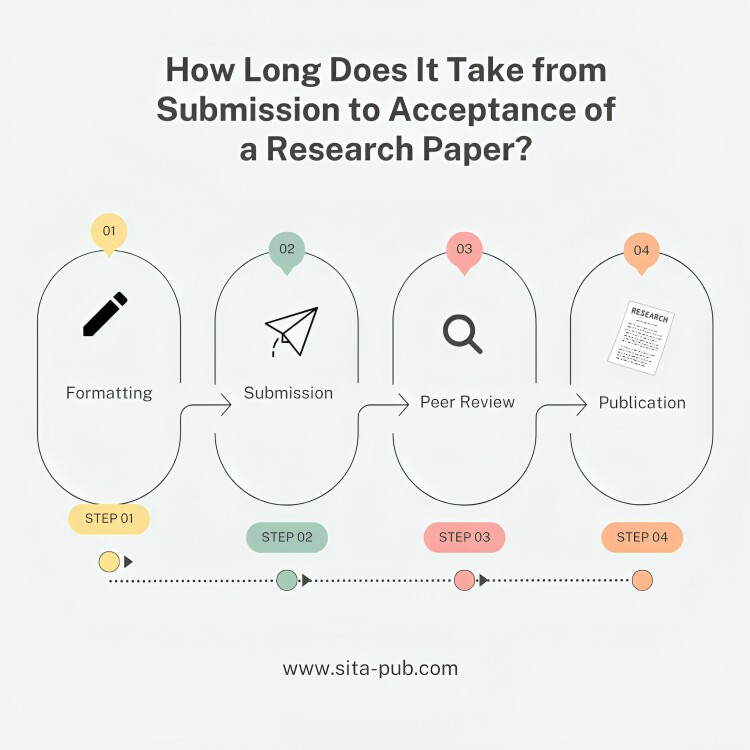How Long Does It Take from Submission to Acceptance of a Research Paper?


Submitting a research paper can be an exciting yet nerve-wracking experience for many researchers. After putting in countless hours of work, it's natural to wonder how long the journey to publication will take. While each submission is unique, there are some common factors that influence the time it takes for a paper to be accepted.

The time from submission to acceptance for research papers varies significantly across journals and fields. On average, many journals take about 2 to 6 months to reach an acceptance decision. Some journals pride themselves on rapid turnaround and may respond in as little as 4 to 8 weeks, while others, especially those with rigorous review processes or high submission volumes, might take 6 months or longer.
It is also important to remember that the journey from acceptance to final publication can add several more weeks or months, depending on the journal’s publication schedule.

Several elements contribute to how quickly your paper moves through the editorial and peer review process:
Journal Scope and Prestige: High-impact journals or those with strict standards may have more extensive peer review procedures, leading to longer timelines.
Submission Volume: Journals receiving thousands of manuscripts yearly may have backlogs, causing delays.
Expedited Review Options: Some journals offer fast-track or rapid review services, often for an additional fee or based on the paper’s significance.
Peer review is the cornerstone of academic publishing, but it depends on expert reviewers who volunteer their time. If a journal struggles to find suitable reviewers or if reviewers delay submitting their reports, the process slows down considerably.
More complex studies with large datasets, novel methodologies, or interdisciplinary approaches may require longer scrutiny. Additionally, papers with unclear hypotheses, poor methodology, or incomplete data often need multiple rounds of revision.
The efficiency of editorial teams plays a role. Well-staffed journals with streamlined processes tend to communicate faster decisions.
Many papers require revisions based on reviewer comments. Multiple rounds of revision and re-review naturally extend the time to acceptance.

To appreciate why timelines vary, it’s helpful to understand the steps involved after submission:
Upon submission, the editor performs a preliminary assessment to ensure the paper fits the journal’s scope and meets basic quality standards. Manuscripts failing this initial screening are desk-rejected quickly, often within days or weeks.
If the paper passes the initial check, the editor invites expert reviewers to evaluate the manuscript. This step can take weeks, as reviewers accept or decline invitations.
Once reviewers accept, they typically have 2 to 4 weeks to provide detailed feedback on the paper’s validity, significance, and clarity.
Based on reviewers’ comments, the editor makes a decision:
Accept: Rare on the first round; paper is ready for publication.
Minor Revisions: Minor tweaks needed; authors usually have a few weeks to respond.
Major Revisions: Substantial changes required; authors may need months to revise.
Reject: Paper does not meet journal standards.
If revisions are requested, authors must address reviewer comments and resubmit. The revised manuscript often goes back to reviewers, adding to the timeline.
After revisions satisfy reviewers and editors, the paper is accepted and moves into production.
In summary, while it usually takes about two months for a research paper to go from submission to acceptance, this can vary based on the journal, the paper’s complexity, and the revision process. Knowing these factors can help you have realistic expectations. Being ready to revise and staying in touch with the journal can also help speed up the acceptance process.
The revision stage can significantly affect the overall timeline. How quickly authors respond depends on:
Nature of revisions: Minor corrections can take a few days to weeks, while major revisions involving new experiments or data collection can take several months.
Author availability: Researchers juggling multiple projects or teaching responsibilities may require more time.
Clarity of reviewer comments: Well-detailed comments facilitate faster revisions.

While the review timeline depends on many external factors, authors can take steps to avoid unnecessary delays:
Selecting a journal that aligns well with your research field and offers reasonable review times can reduce waiting periods. Using journal finder tools and consulting with colleagues can help.
Journals provide detailed submission instructions regarding formatting, length, and supporting materials. Strict adherence prevents desk rejection and resubmission requests.
Ensure your manuscript is clear, concise, and free from errors. Use professional editing services if necessary, especially if English is not your first language.
Address all comments systematically, providing clear explanations of changes made or reasons for disagreement. Timely responses speed up re-evaluation.
If you experience long delays without updates, it is appropriate to politely inquire about your manuscript status.
Navigating academic publishing can be overwhelming, especially for early-career researchers or those unfamiliar with the process. Many authors turn to professional services or academic consulting to help:
Selecting appropriate journals with faster review processes.
Preparing manuscripts to meet journal standards.
Managing submission and communication with editors.
With expert assistance, researchers can optimize their chances for quicker acceptance and reduce stress.

The average time from submission to acceptance ranges from 2 to 6 months, but can be shorter or longer.
Timelines depend on journal policies, reviewer availability, manuscript quality, and revision rounds.
Being proactive—choosing the right journal, preparing your manuscript well, and responding quickly to feedback—helps reduce delays.
The review process involves multiple steps: initial check, peer review, editorial decision, revisions, and final acceptance.
Patience and professionalism are essential during the process.
If you’re eager to get your research out to the world without unnecessary delays, consider seeking expert guidance. Our team specializes in assisting researchers like you to navigate journal selection, manuscript preparation, and submission management with efficiency.
Contact us today to learn how we can help you achieve timely acceptance and share your valuable work with the scientific community.

If you have any questions, inquiries, or would like to learn more about our services, please don't hesitate to reach out to us. Our dedicated team is ready to assist you.